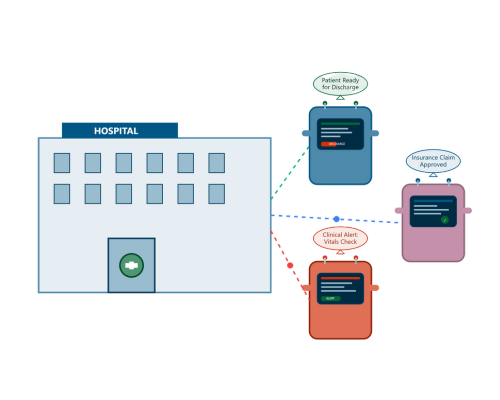Imagine a healthcare system where digital agents coordinate patient discharge, resolve insurance claims, and support clinicians—all with minimal human intervention. This is not a distant vision; it is an emerging reality powered by AI agents.
In a recent article, McKinsey & Company explores how AI agents are poised to revolutionise healthcare operations. At RPATech, we are already turning that vision into practice, combining robotic process automation (RPA), intelligent document processing, and AI to create agent-based systems that boost efficiency, reduce errors, and unlock time for critical human judgment.
What Are AI Agents—and Why Do They Matter in Healthcare?
AI agents are autonomous, intelligent digital entities capable of performing complex tasks without constant human direction. Unlike simple bots or scripts, AI agents can reason, learn, make decisions, and collaborate with other agents. In healthcare, they offer enormous potential—from streamlining repetitive administrative workflows to enhancing patient support and reducing operational overhead.
McKinsey outlines a three-part AI agent framework:
- Orchestration agents: Coordinate task allocation and manage workflows
- Task agents: Execute specific activities like prior authorizations or discharge planning
- Supervisory agents: Monitor performance and escalate tasks as needed
At RPATech, we implement this model using our Proprietary D3O (Discover, Design, Develop and Optimise) and A3 (Assess, Accelerate & Amplify) Frameworks to address key pain points across the healthcare value chain.
Turning Concepts into Action
Healthcare organizations often struggle with legacy systems, fragmented data, and manual-heavy operations. Our AI-powered digital workforce integrates with EHRs, insurance platforms, CRM systems, and more—enabling secure, scalable automation.
Here is how RPATech helps translate the promise of AI agents into reality:
Claims Lifecycle Management
- Before: Hours spent verifying data, coding procedures, chasing documents
- With RPATech Agents:
- Auto-validation of insurance data
- Drafting and submission of claims
- Tracking denials and triggering appeals with prefilled templates
Appointment Scheduling & Intake
- Pre-visit triage agents gather symptoms, insurance details, and suggest care pathways
- Agents send personalized reminders, prepare intake forms, and alert staff in case of anomalies
Revenue Cycle Optimization
From coding and billing to payment reconciliation, AI agents ensure clean claim submissions, reduce cycle time, and escalate anomalies for human review
Our Implementation Method: Human-Centric, Tech-Enabled
At RPATech, we follow a step-by-step, risk-aware deployment strategy:
- Process Discovery & ROI Mapping
Identify high-volume, high-impact tasks suitable for automation - Pilot with Guardrails
Launch minimal viable agents with human-in-the-loop (HITL) checkpoints - Scale to Agent Ecosystems
Enable task collaboration and orchestration across workflows - Ensure Governance
Audit logs, compliance rules, escalation protocols built into every agent - Drive Adoption
Co-create with your teams, ensure seamless integration into day-to-day ops
RPATech's Implementation Method
Why Choose RPATech for AI in Healthcare?
- Platform-Agnostic: We work across your existing systems
- Domain Expertise: Deep understanding of healthcare and insurance workflows
- Fast Deployment: Rapid prototyping, and scalable architectures
- Quick ROI Realization: Well-defined outcomes, Quick ROI realization
Looking Ahead
McKinsey rightly notes that AI agents are “poised to redefine how work gets done.” At RPATech, we’re not just observing the change, we are building it.
If you are exploring how to bring AI agents into your healthcare operations, we are ready to partner with you, from strategy to deployment.
Let’s Talk About Building Your Digital Workforce
Book a Consultation with Our Experts
Fill out the form below for personalised guidance.
Read the original McKinsey blog: What are AI agents—and what can they do for healthcare?




